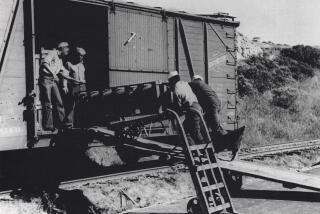Indianapolis Survivors Feted in Newport
- Share via
They are quite a bit older now, a little slower in step, but the survivors of the U.S. heavy cruiser Indianapolis stood tall Thursday as they were saluted as heroes at a ceremony in Newport Beach.
They have told their stories hundreds of times, but they don’t see themselves as heroes. They are among the 316 men who survived after the ship was struck by two torpedoes from a Japanese submarine in the last days of World War II.
Of the nearly 1,200 men aboard the vessel, which sank in 12 minutes, about 900 floated in shark-infested waters for four days with no lifeboats, food or water.
Because of poor communication and other errors, the ship’s loss went unnoticed until a passing aircraft happened to spot the survivors.
“People ask me, ‘Do you feel like a hero?’ ” said Lyle Umenhoffer, 78, a San Gabriel resident and one of the seven Southland men honored Thursday at Lido Marine Village as part of the 23rd annual Lido Yacht Expo. “I tell them, ‘No. I feel like I was there.’ ”
As James Bras, president of the Orange County Council of the Navy League, read a detailed account of the men who died and the survivors, the small group aboard a 70-foot yacht was silent.
Ed Brown of Dana Point, 76, a gregarious bear of a man, had been laughing and holding court just minutes earlier. As Bras described the events of July 30, 1945, in the Philippine Sea, Brown, his head bowed, wiped away a tear. He wasn’t alone.
“I can’t be at one of these [ceremonies] without crying,” said Verne Foster, 74, of Huntington Beach.
Foster, Brown and Jacob “Jake” Greenwald, 84, of Santa Ana usually get together every two years for a reunion in Indianapolis.
“The reunion used to be every five years, but we’re getting too old, so they made it every two years,” Brown said.
The first such gathering, in 1960, “was sensational,” he said. “Capt. [Charles] McVay came to that one.”
McVay was court-martialed and convicted of “hazarding his ship” by failing to take evasive action in hostile waters, despite overwhelming evidence that the Navy itself had placed the ship in harm’s way by not providing a destroyer escort.
“We had the opportunity” at that first reunion “to tell him, to a man, we’d go to sea with him if he had another command,” Brown said.
McVay committed suicide in 1969. He was exonerated posthumously in October 2000 of the loss of the ship and crew after survivors and supporters worked to get special legislation passed.
More to Read
Sign up for Essential California
The most important California stories and recommendations in your inbox every morning.
You may occasionally receive promotional content from the Los Angeles Times.













